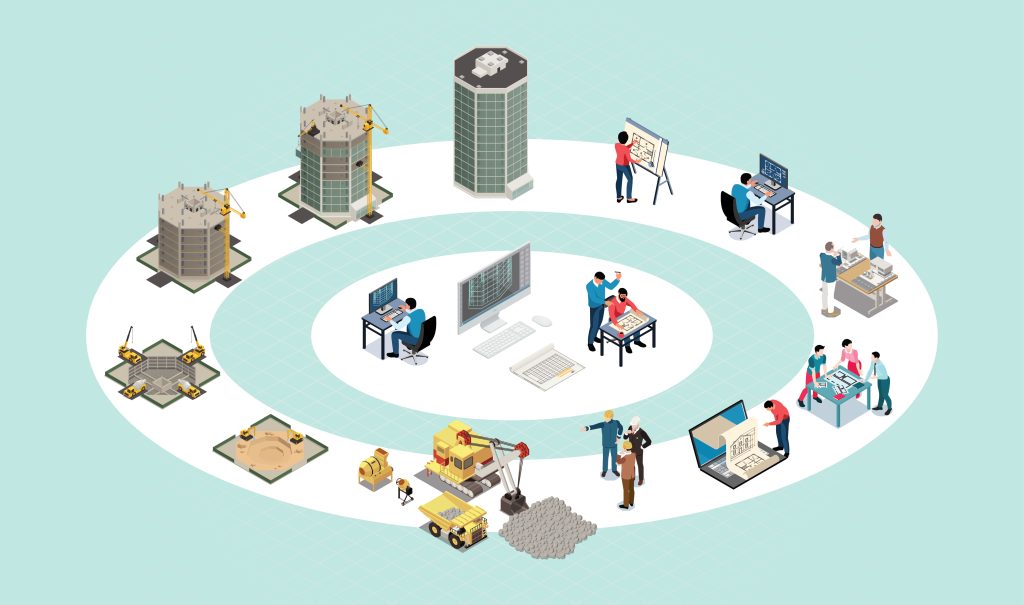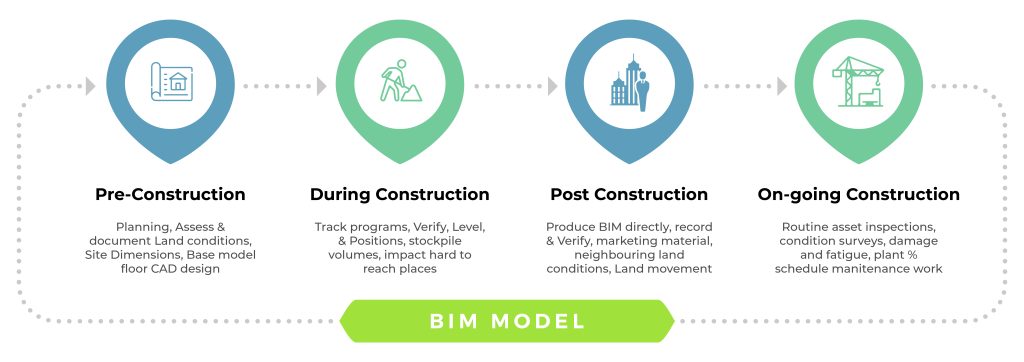How Construction Mobile Apps empower the BIM
Deloitte 2022 Construction Industry Outlook
The Deloitte 2022 Construction Industry Outlook reports that the recession impacted many construction companies who experienced workforce shortages; the rising cost of materials and equipment and supply chain disruptions put pressure on the industry’s margins.
South African construction companies are experiencing many of the same challenges, but with the added burden of load shedding, and a weak rand.
In addition to these challenges top-of-mind for executives in construction companies are:
- The absorption of next-generation digital technologies;
- The integration of data and analytics into workstreams;
- and the implemention of end-to-end connected construction capabilities.
These technologies can help construction firms support modern initiatives such as smart cities and urban air mobility, but also can enhance internal operational efficiencies, reduce costs and improve margins.
Deloitte identified 5 themes to watch closely in construction in 2022, one if which is Connected Construction.

What is Connected Construction?
Connected Construction consists of a set of technologies which include inter alia Building Information Management (BIM), digital supply networks, digital twins, predictive maintenance, asset tracking (IOT) and autonomous drones, with the objective of bringing assets, people, processes and job sites onto one platform.
Connected Construction consists of a set of technologies which brings assets, people, processes, and job sites onto one platform.
At the centre of these investments is the creation of command centres or control towers that will optimise efficiencies across projects, transforming problem-solving approaches from being reactive to being predictive, thereby relieving the pressure on profit margins.
Mobile Apps, can play a significant role in capturing and delivering information on construction projects, and place a wealth of knowledge right in construction workers’ back pockets.
In a recent Deloitte survey, 43% of E&C executives indicated greater investments in new design processes, such as focusing on BIM, over the next year.
Deloitte
Building Information Model
It might be important to first have a look what information is used in the construction industry.
The BIM (Building Information Model) life-cycle of a construction project is a commonly used framework for collecting and organising information relating to the building project.
Building information modeling (BIM) is an intelligent software modeling process that architects, engineers, and contractors can use to collaborate on a building’s design, construction, and operation.

BIM is useful at every stage of a construction project, such as:
- Design: Using a model, architects and engineers can test out potential designs and identify problems immediately.
- Planning: Referencing the model, contractors can make estimates in cost and timeline and make improvements to the construction process.
- Construction: With the model always accessible, construction workers can clearly identify tasks and receive real-time updates about changes.
- Operation: After construction is complete, a facilities manager has access to the model, which is essentially an improvement over as-built drawings, showing all of the building’s features and systems.
Huge potential of Construction Mobile Apps
Construction management apps can save companies a lot of time and money, if companies use the right app for their business.
While cheaper apps with limited functionality can be tempting, they come with a lot of double entry and can cause delays. Many of those apps aren’t built to help with more than one aspect of a job site.
And while the business might only want field notes now, being able to see drawings in the field quickly and track time can reduce a lot of future stress.
Eliminate paper processes with Construction Mobile Apps
Make missing data sheets a thing of the past. Mobile applications can play a large role in the construction industries, eliminating error-prone, time-consuming paper processes and improving workflow and efficiency.
Improve Construction Project Efficiency
A key reason for construction companies looking for technology solutions is when they find themselves running into operational problems and realizing that existing practices are insufficient.
Some of the challenges experienced by Mobile App adopters included timeous access to site reports and geo-located timesheets. Being able to share daily reports and completion reports with customers were other challenges.
Using mobile delivery applications, construction managers can improve the efficiency and transparency of the entire construction project, from authorization and accountability to scheduling and monitoring.
Construction projects consist of multiple authorization controls in order to progress. Every building project phase requires approval and there is also a need to flag any complications that arise during the project.
Mobile delivery apps also help with supplier scheduling and management. For example, a ready-mix concrete company can use a mobile app in which the supplier can share a map interface with the customers and offer active management of service-level agreements.
Mobile applications replace manual, paper-based data entries. Paperwork takes days to process and can get lost in the shuffle. For even more measurable results, mobile provides transparency of activities for improved management of deadlines.
Integrating mobile apps into every process improves the accuracy of project sequences, enhances workforce accountability and provides hard metrics upon completion of each service, which helps to improve the relationship between all parties involved in the construction project.
Ensure Construction Site Safety Compliance
Construction is a high-hazard industry with a high injury rate. This calls for the prioritisation of Health and Safety requirements such as health reports and tracking completion of regular job-training sessions to improve worker safety and ensure regulatory compliance a big priority.
Mobile platforms facilitate the immediate reporting of all safety concerns and injuries. This ensures timely and proper management of such issues, further strengthening regulatory compliance.
Minimize Costly Project Delays
Construction project managers face multiple challenges from loss of on-site equipment, stock losses, producing material reports, ordering material (such as concrete) and producing MSDSs (Material Safety Data Sheets) documents.
Delays and rework are common in commercial construction projects and can cost millions in lost revenue and negatively affect a construction company’s reputation.
While uncontrollable events include weather conditions or permit and licensing red tape applications, managers CAN organize and sync their operational activities via mobile delivery apps to optimize the schedule.
Mobile Apps can help manage the distribution and delivery of inventory and materials in real time allowing managers to see projects through to completion, reducing delays and providing greater awareness of project goals.
Implement Cost-Effective Mobile Options
The high adoption rate of smartphones and cloud technology has made the process of incorporating a mobile application model seamless.
Construction projects have many moving parts and many role-players. Mobile Apps can help create single operational view.
Effective Communication
With project managers, owners (customers), and supervisors, communication can be a challenge, as seen from this graphic.

Owners might not know what the project managers are doing while project managers might not know what happened in the field.
Communication between the three role-players can make all three role-players better understanding of the project’s status and the need for resources.
Construction management apps give all three groups oversight into the project and improve communication.
Project managers can respond to situations by instantly pushing communications to field staff.
Conclusion
The lesson in such an information-heavy industry, such as construction, is clear – digitise upfront, not after the event or later in the project. And
Early adopters of construction Mobile Apps are reporting ROI figures of between 250% and 1000% with Payback periods of less than a year.
Click here to find out more about Vibe Marketing East Coast, or here to speak to one of the Vibe Marketing team.

